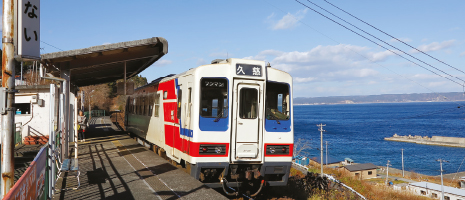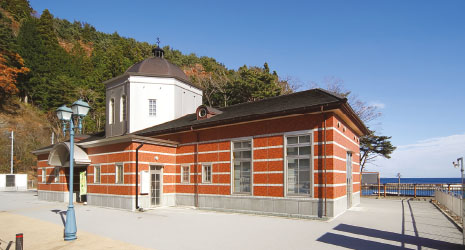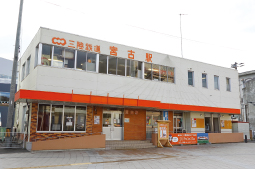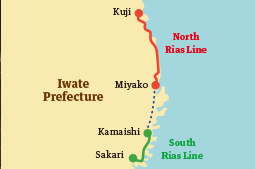Home > Highlighting JAPAN > Highlighting Japan March 2019 > Policy-Related News
Highlighting JAPAN


Connecting Sanriku, Connecting People
The Sanriku Railway resumed limited operations just five days after the 2011 Great East Japan Earthquake, and had restored all the rail lines in the north and south sections by 2014. In March 2019, a new line will connect the ends of the north and south—Kamaishi and Miyako—covering the entire Sanriku area in Iwate Prefecture. Two railroad men share their stories of the challenges involved in restoring train operations and passing down memories of the aftermath.
On March 11, 2011, the Great East Japan Earthquake devastated the Pacific coast of the Tohoku region. Just five days after the quake, however, the Sanriku Railway in Iwate Prefecture had restored service between Rikuchunoda and Kuji stations on the North Rias Line. Atsushi Tomite from the passenger services division, who surveyed the situation after the earthquake, reflects on the situation at the time.
“While we were checking the damage along the rails three days after the earthquake, we saw many people walking along the tracks that the tsunami had not washed away,” he says. “Our company president decided that we had to restart the trains as soon as possible, understanding that they were looking for people and to obtain necessary items but couldn’t use the national highways, which had been buried in debris. So we ran free train services as a part of reconstruction assistance.”
Sanriku Railway trains gradually extended operations to cover the distance they once traveled before the disaster, thanks to the mighty efforts of the railway staff as well as cooperation from the Japan Self-Defense Forces, who were assigned to assist their efforts after the railway appealed to the mayor of Miyako City. As it steadily recovered, the Sanriku Railway must have given hope to those struggling to rebuild their lives after the earthquake.
In 2013, the popularity of national public broadcaster NHK’s TV drama Ama-chan, which was set in areas along the Sanriku Railway lines, boosted the number of visitors. In April 2014, both the North and South Rias lines were fully restored, which brought the railway completely back to pre-earthquake operations.
There will be even more good news this spring. “The JR Yamada Line, which connects the Sanriku North and South Rias lines, was entirely out of service due to the tsunami. However, Sanriku Railway will take over operations after JR completes restoration work on the line. This line will make a fresh start as the Sanriku Railway Rias Line on March 23, so the 163 kilometers between Sakari Station in Ofunato City and Kamaishi, Miyako, and Kuji Station will be connected by rail,” Tomite shares enthusiastically.
Sanriku Railway is also keen to use the knowledge gained from the earthquake to prepare for natural disasters by passing the knowledge down to younger generations. “The Disaster Education Train started in June 2012, mainly aimed at elementary to high school students,” explains planner Mamoru Nihashi from the passenger sales department. “This special train ride is dedicated to disaster prevention study. Using photos and slowly passing by train through the areas affected, we explain what it was like when the earthquake happened as well as the current state of the reconstruction, in addition to discussing future issues with students. Our staff and local residents serve as guides. Every victim feels differently about the earthquake depending on their experience, and each has views about issues that should be addressed.”
While the content of the study program varies slightly depending on the guide, Nihashi believes it is important to deliver this message as-is. “In the end, every guide sends a message that they hope students will bravely take on future challenges and understand the importance of knowing about disaster prevention,” he says. “They also cultivate an awareness for the large number of people nationally and internationally who cooperated to restore the lines, and the importance of bonds with friends and family.”
The railway plans to operate the Disaster Education Train on the new section connecting the North and South Rias lines as well. “While this new section is still in the Sanriku area, geographical features, damage from the disaster, and the current state of reconstruction are not the same. We’ll carefully investigate and expand the earthquake learning program,” concludes Nihashi.
The Sanriku Railway’s speedy recovery and efforts to connect people, preserve memories and pass along knowledge make it a railway with great heart.
© 2009 Cabinet Office, Government of Japan








